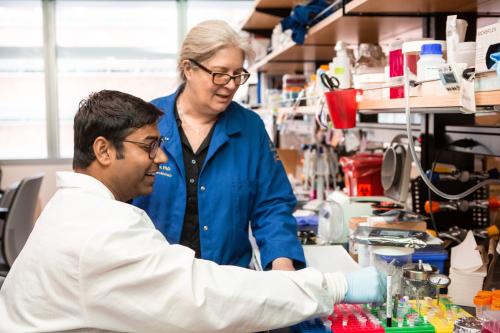
UCLA Broad Stem Cell Research Center receives $5 million CIRM grant for research training program
The Eli and Edythe Broad Center of Regenerative Medicine and Stem Cell Research at UCLA has been awarded $5 million by the California Institute for Regenerative Medicine, the state’s stem cell agency, to train young scientists and physicians to become leaders in the stem cell and regenerative medicine field.
The five-year grant will enable the center to expand its Stem Cell Training Program, which was established in 2006 and funded by CIRM until 2015, when the agency changed its funding priorities. Since then, the program has been sustained by philanthropy. With the passage of Proposition 14 last fall, however, CIRM has once again made funding these programs one of its top initiatives.
CIRM lauded UCLA’s program for its “impressive outcomes,” highlighting the many trainees who move on to academic positions and senior roles in biotechnology. “This is a very strong program at an excellent campus, with a renowned research environment,” the agency’s grant reviewers wrote.
Roughly a dozen UCLA graduate students, postdoctoral fellows and early-career physician-scientists are selected annually for the yearlong program, in which they conduct stem cell research alongside top faculty members with the goal of accelerating the development and delivery of new treatments to patients. Participants have the opportunity train with experts in cell and molecular biology, gene medicine, cell-based therapy and organ transplantation.
“In addition to learning the latest techniques in the lab, trainees take a course that covers not only developmental and stem cell biology but intellectual property management, communicating science to the public, and the ethical, legal and policy implications of stem cell research,” said Dr. S. Thomas Carmichael, the center’s interim director and chair of the neurology department at the David Geffen School of Medicine at UCLA. “Training these scientists from a multidisciplinary perspective will enable them to confidently shape the future application of stem cells with the overall goal of improving the human condition.”
Through formal classroom training, seminars, laboratory research and mentorship by faculty from a variety of disciplines, participants are equipped with a critical background in stem cell biology, an understanding of human disease and the knowledge they need to translate basic research findings from the laboratory to the clinic.
“A key goal is to support and promote interaction among individuals from diverse fields, including the basic sciences, engineering, translational research and clinical medicine,” said program director William Lowry, a professor of molecular, cell and developmental biology at UCLA.
The program’s expansion will include an increased emphasis on public outreach activities, including direct engagement with patients, to better understand and raise awareness of patients’ needs. By broadening its efforts in the community, the program aims to prepare a workforce of skilled stem cell ambassadors who foster sensitivity around issues of access, equity and inclusion and understand how these challenges impact the development of therapies for all.
In total, 156 researchers have graduated from the program, many of whom now hold positions in industry, academia and medicine. Six previous center trainees who are now tenure-track professors at UCLA will be serving as program mentors.
“The program gave me a more balanced view of the entire field of stem cell research and showed me the potential for collaboration at UCLA,” said Luis de la Torre-Ubieta, a trainee-turned-mentor and an assistant professor of psychiatry and biobehavioral sciences at UCLA. “I’m excited to work with my mentees and see how they think about science and come up with new ideas that I haven’t thought of before.”